In recent years, the melding of real estate and technology is rapidly changing the landscape of the industry. Innovations are not just enhancing processes but fundamentally altering how investors, property managers, brokers, and consumers perceive and interact with real estate.
Amid the buzz surrounding the rise of PropTech startups, a pivotal question emerges: Where are we headed next? This is not just a chase for the newest trend; it's about strategically adapting to and crafting solutions tailored for a diverse audience ranging from seasoned investors to the everyday home buyer or seller. Dive into this comprehensive guide on the transformative wave of PropTech in 2025 and expect to walk away with:
- An understanding of the basics of property technology (PropTech)
- Key reasons real estate professionals embrace PropTech
- 7 PropTech trends to watch in 2025
- What is PropTech
- 7 Proptech Trends Transforming the Real Estate Industry Forever
- 1. Emergence of fractional investment platforms
- 2. AI-powered real estate assistants
- 3. Virtual tours built using VR & AR tech
- 4. Prevalence of peer-to-peer platforms (FinTech)
- 5. Smart IoT property maintenance
- 6. Big data analytics and predictive modeling
- 7. Convenient all-in-one real estate transactions
- The Future of Proptech
- Conclusion
What is PropTech
PropTech, or property technology, refers to the digital innovations and technological advancements that are disrupting and transforming the real estate industry. PropTech software includes a wide range of applications, from online buying and selling platforms and property management software to innovative architectural technologies, smart home solutions, and even the use of drones for property surveys.
PropTech aims to make real estate transactions and property management more efficient, transparent, and user-friendly. This can be achieved by either improving existing processes using technology or by introducing entirely new business models.
There are many sub-categories of proptech, including:
- Real estate marketing & CRMs: Platforms that seamlessly merge marketing tools with CRM functionalities, empowering agents to manage leads, automate communications, and enhance client relationships from one central dashboard.
- Market reports & property valuation: Leveraging 3rd-party real estate APIs to provide insights into property values, trends, and other pertinent information.
- Property management software: Tools and software that help landlords or property managers oversee their properties efficiently.
- ConstructionTech (or ConTech): Innovations in the construction sector to optimize the building process, like 3D printing or modular housing.
- Marketplaces & search: Platforms that assist users in the property search process or facilitate the buying/selling journey, like Zillow or Redfin.
- Virtual reality & augmented reality: Solutions that offer virtual tours of properties or allow users to visualize changes they might want to make to a space before buying or renovating.
Why real estate professionals embrace PropTech
Because property technology encompasses such a wide range of solutions, it’s no surprise that real estate professionals, property owners, and other stakeholders will each have their own unique motivation for investing in property technology. Some key benefits that motivate real estate industry professionals include:
Efficiency and speed: Leveraging artificial intelligence and machine learning to automate and streamline processes, PropTech tools significantly reduce the time required for transactions and property management tasks, enhancing overall efficiency and speed.
Data-Driven decisions: Utilizing predictive analytics and real-time data from integrated PropTech ecosystems enables more accurate market predictions, optimizing investment strategies and property valuations based on comprehensive, data-driven insights.
Enhanced customer experience: Implementing virtual and augmented reality technologies provides immersive property tours and interactive design visualizations, while AI-driven personalization meets the evolving demands of modern consumers, leading to improved engagement and satisfaction.
Cost savings: Automation and digitalization not only reduce operational costs but also incorporate green technologies such as energy-efficient systems and renewable energy sources. This dual focus on cost savings and sustainability makes services more affordable, competitive, and environmentally responsible.
7 Proptech Trends Transforming the Real Estate Industry Forever
The real estate sector, traditionally seen as slow to innovate, is undergoing transformative changes thanks to the infusion of cutting-edge technology. Understanding these pivotal shifts is crucial. In this section, we'll explore the specific, pivotal innovations, and trends that are reshaping the industry's very foundation. Each of these PropTech trends will offer a roadmap for future-forward strategies and solutions.
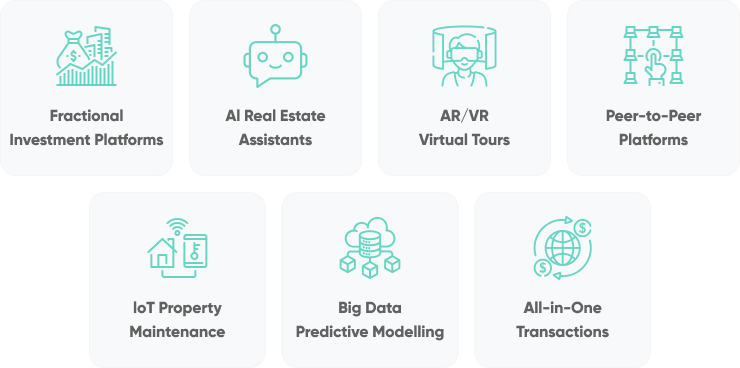
Emergence of fractional investment platforms
The first of the PropTech trends we will look at is the emergence of fractional investment platforms, which are democratizing the world of real estate investment. Traditionally, real estate investments required considerable capital, limiting opportunities for many.
Today, thanks to emerging platforms and software, individuals can now invest in fractions of properties, enabling them to gain a stake in prime real estate with significantly less capital. By pooling resources with other investors, one can partake in the profits and appreciate the value of high-demand properties without owning them outright.
What you need to know:
- Fractional investments democratize real estate, lowering capital barriers.
- Pooling resources with other investors facilitates entry into high-demand real estate markets.
- As the PropTech industry evolves, fractional investments are set to expand, reaching broader demographics and global markets.
Example companies:
Pacaso is a platform that facilitates fractional ownership of luxury second homes. It offers a structured approach to co-ownership, providing a platform for users to buy a share of a second home, coupled with property management services.
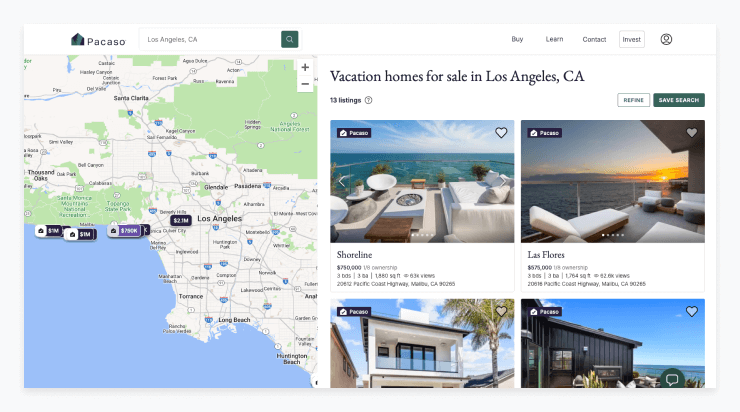
Other platforms in the fractional real estate space include Fundrise, which offers diverse real estate project investments, and Arrived, focusing on shares of rental properties.
AI-powered real estate assistants
At their core, AI-powered real estate assistants are digital aids that harness artificial intelligence to digest, analyze, and respond to vast quantities of data at speeds and with precision that far exceed human capabilities. They provide real estate professionals with invaluable insights into property valuations, emerging market trends, and potential risk factors, all by processing and making sense of the myriad data points available in the market.
This evolution means real estate professionals can delegate an increasing number of tasks—ranging from drafting listing descriptions to real-time market trend forecasting—to AI-driven systems. Rather than spending hours combing through property data or manually crunching numbers to predict market fluctuations, agents and investors can rely on AI assistants for faster, data-backed recommendations, saving both time and operational costs.
What you need to know:
- AI-powered assistants can now automate everything from property listing optimization (using generative AI for compelling descriptions) to intelligent lead management, significantly boosting productivity in the real estate workflow.
- Advanced personalization is on the rise: AI algorithms analyze user preferences, browsing history, and demographic data to deliver laser-targeted property recommendations.
- Risk analysis has become more precise with AI. By crunching transactional, demographic, and broader economic data in real time, these systems can highlight potential pitfalls and opportunities earlier than ever before.
Example companies:
HouseCanary is a platform that leverages advanced analytics and AI to provide comprehensive real estate data solutions. It offers insights into property valuations, market trends, and risk assessments, serving as a valuable assistant for real estate professionals making data-driven decisions.
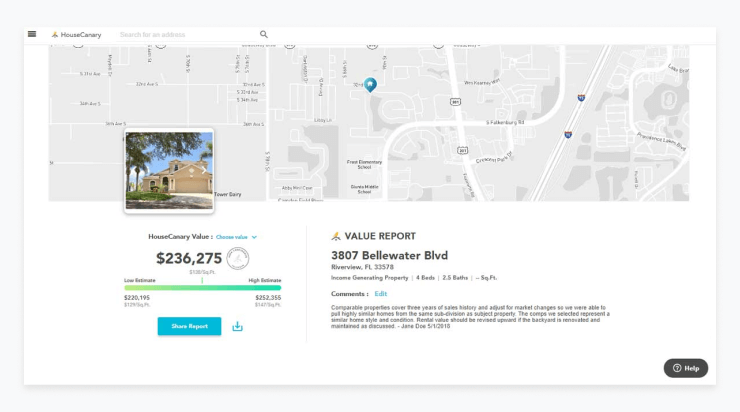
Other AI-powered real estate tools include Entera, which streamlines property acquisition with AI-driven insights, and JobCall, offering intelligent automation for real estate job tasks like document drafting and scheduling property tours — all powered by AI agents which are becoming more autonomous, capable of making decisions and taking actions without human intervention.
Virtual tours built using VR & AR tech
Virtual Reality (VR) and Augmented Reality (AR) are revolutionizing the way potential buyers and renters experience property viewings. By melding the physical and digital worlds, these technologies offer a level of immersion that traditional property viewings simply cannot match. With the power of VR and AR, viewers can take a detailed tour of a property without ever stepping foot inside, allowing them to visualize spaces, furnishings, and even potential renovations in real-time. The impact of this shift is undeniable; properties offering virtual tours see a staggering 40% increase in online engagement compared to those that don't.
What you need to know:
- Using VR and AR tools, buyers benefit from exploring multiple real estate properties without on-site visits.
- Sellers and agents access a wider audience, including international and distant buyers.
- AR tools allow users to envisage renovations and furniture layouts, facilitating faster decisions.
Example companies:
Matterport is a pioneering platform in the realm of VR and AR virtual tours. It capitalizes on cutting-edge technology to provide users with detailed and immersive 3D property tours.
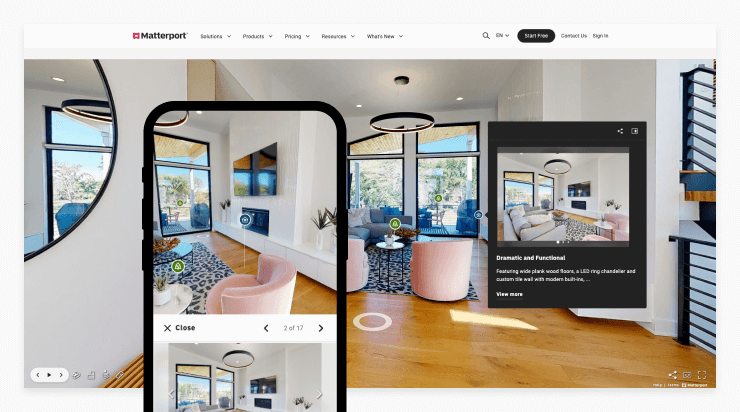
Other noteworthy tools in the VR & AR virtual tour domain include iStaging, known for its customizable virtual staging solutions, and My360 Tours, which specializes in 360-degree property tours with a global reach.
Prevalence of peer-to-peer platforms (FinTech)
The rise of peer-to-peer (P2P) FinTech platforms in the PropTech sector marks a transformative shift in how real estate transactions occur. These digital platforms directly connect buyers and sellers, eliminating traditional intermediaries and often resulting in cost and time efficiencies when buying or selling residential and commercial properties.
Beyond the evident financial benefits for both buyers (in the form of potentially reduced prices) and sellers (maximized profits without agent commissions), this trend represents a democratization of the real estate market. The streamlined process, enhanced by tools for analytics and digital documentation, challenges the industry's status quo, urging all stakeholders to adapt and innovate.
What you need to know:
- P2P FinTech platforms bypass traditional real estate agents, connecting buyers and sellers directly.
- The global P2P lending market, significantly influenced by real estate, is projected to reach $705 billion by 2030.
- The trend prompts traditional agents to evolve, emphasizing value-added services or targeting niche market segments.
Example companies:
eXp Realty provides a digital infrastructure, facilitating direct interactions between buyers and sellers. As part of its operational model, eXp Realty emphasizes transparency and efficiency in real estate transactions.

Also operating in the P2P FinTech realm for real estate are Fintown, which offers real estate financial tools, and Homie, which employs a technology-centric model for home buying and selling.
Smart IoT property maintenance
Smart IoT (Internet of Things) is redefining how property maintenance and monitoring is done. Fortune Business Insights predicts a 26% annual increase in the global IoT market by 2029. This digital transformation ensures that commercial buildings and homes are not just structures but interconnected ecosystems. With sensors and smart devices, real-time monitoring of everything from energy consumption to potential leaks becomes possible, optimizing building health and efficiency.
Through the deployment of sensors and smart devices, real-time monitoring extends beyond residential concerns, addressing the unique challenges of commercial properties. Monitoring aspects such as energy consumption, HVAC system performance, and potential infrastructure issues like leaks become standard. For commercial property managers, this means improved operational efficiency, lower maintenance costs, and the ability to preemptively address issues before they escalate.
What you need to know:
- Real-time monitoring with IoT devices can track energy usage, detect anomalies, and preempt potential issues—ultimately prolonging equipment lifespans and reducing costly surprises.
- In residential settings, IoT enhances homeowner comfort and security while contributing to energy savings and a reduced carbon footprint. Smart thermostats, water leak sensors, and predictive maintenance alerts are increasingly common.
- In commercial spaces, IoT’s impact spans operational efficiency and cost savings. Leveraging AI analytics on sensor data is quickly becoming standard practice, allowing facility managers to predict and avert system failures in advance.
Example companies:
VergeSense is a prominent player in the Smart IoT domain for property maintenance. Through the use of its advanced sensors and analytics, VergeSense turns buildings into connected ecosystems, providing real-time data that facilitates proactive management and optimizes building health and efficiency.
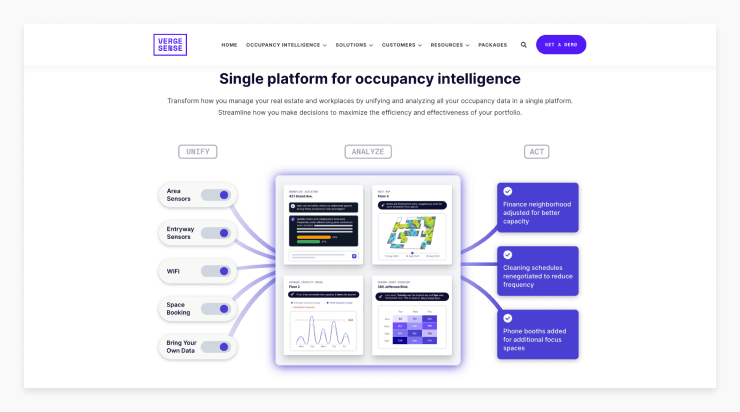
Other notable platforms utilizing Smart IoT for property maintenance include Emnify, which offers insights through IoT connectivity, and Axper, which specializes in people-counting solutions to enhance property utility and efficiency.
Big data analytics and predictive modeling
Big data analytics and predictive modeling are increasingly becoming the backbone of informed decision-making in the real estate industry. Harnessing vast amounts of data, from city planning schedules to demographic shifts, these tools provide invaluable real estate market insights without much data engineering.
For instance, by analyzing data on forthcoming city infrastructure, like metro station constructions, investors can pinpoint areas likely to see significant property value surges.
What you need to know:
- Big data analytics in PropTech sifts through massive datasets to extract actionable insights, enabling investors to identify potential areas of growth and optimize their portfolios.
- Through predictive modeling, professionals can forecast property value surges, often influenced by city developments such as new metro stations or infrastructural changes.
- As urban areas lean towards data-driven strategies, the link between city development projects and resultant property value changes strengthens, underscoring the importance of these analytics tools in real estate.
Example companies:
Cloud CMA is a big data analytics and predictive modeling platform for the real estate sector. It provides a robust suite of tools that assist real estate professionals in generating comprehensive property reports, comparative market analyses, and buyer tours.
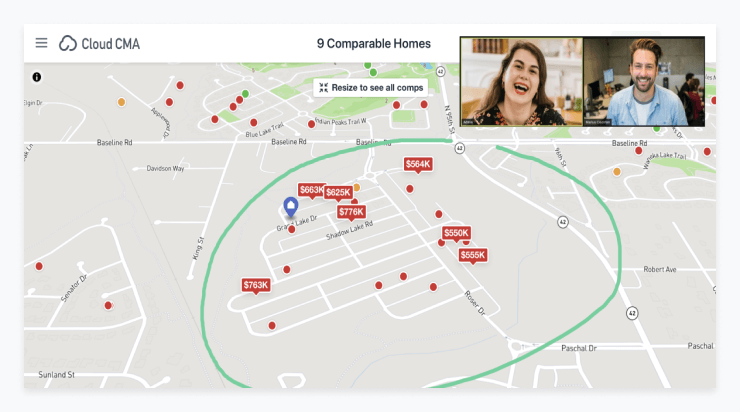
In the expansive realm of big data in PropTech, other notable platforms include CoreLogic, which offers advanced property data solutions, and Zilculator, a tool tailored for real estate investment analysis.
Convenient all-in-one real estate transactions
The landscape of real estate is undergoing a profound transformation with the emergence of all-in-one transaction platforms in PropTech. These platforms are simplifying the complex web of real estate processes, offering a one-stop solution for buying and selling properties.
Rather than navigating through separate agents, lenders, and legal services, users can streamline their transactions on a singular platform, ensuring seamless property transfers. Such integrations can expedite the transaction process and reduce the stress of selling and buying real estate assets.
What you need to know:
- All-in-one platforms increasingly rely on AI-driven virtual assistants to guide users, answer queries, and handle routine tasks like scheduling showings, evaluating mortgage options, and even generating property comparisons.
- Automating critical steps such as valuations and pre-approvals can significantly shorten transaction timelines, alleviating common pain points for buyers, sellers, and investors.
- Demand for seamless real estate experiences has led to the integration of legal, lending, and property management services under one umbrella—indicating that all-in-one PropTech companies will continue to expand their offerings.
Example companies:
Knock is an all-in-one transaction platform that provides an integrated solution for the real estate process. By consolidating various steps, from home searching to securing mortgages, it aims to offer users a more coherent path through the property transaction process.
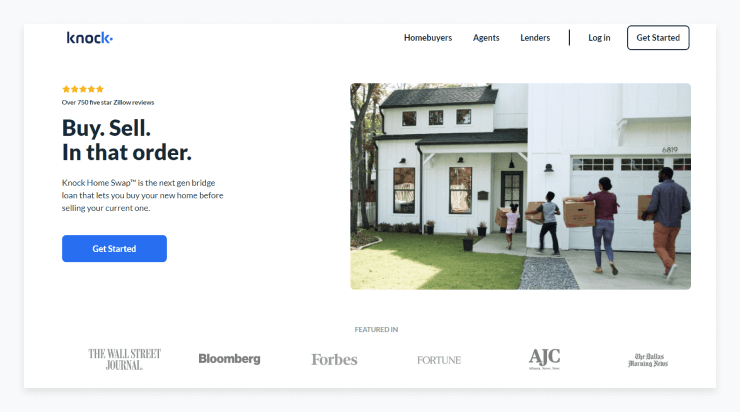
Other platforms that offer integrated real estate transaction services include Opendoor, which facilitates both selling and buying of homes, and Ohmyhome, which provides tools for housing transactions.
The Future of Proptech
The future of PropTech is more than upgrading traditional real estate—it’s a sweeping transformation of how we interact with, invest in, and shape our built environment. AI and predictive analytics are already making waves, as highlighted by leading industry voices, enabling precise market insights, smarter property valuations, and dynamic pricing models.
Beyond transactions, tomorrow’s buildings will be smarter and greener. By integrating IoT and automated energy-management systems, properties can adapt in real time, reducing waste and maintenance costs while enhancing comfort and sustainability. As tech and real estate continue to converge, expect a new era where livable, sustainable, and tech-enabled communities redefine how we experience the spaces we call home.
Conclusion
PropTech is reshaping the dynamic real estate landscape, introducing significant innovations to traditional property transactions and management. Professionals and consumers alike must adapt to stay competitive in this tech-driven market.
Looking for a PropTech software development company? At SoftKraft we’ll work closely with you to understand your specific goals, map out a strategic solution, and build software efficiently. Get in touch for a free project quote!





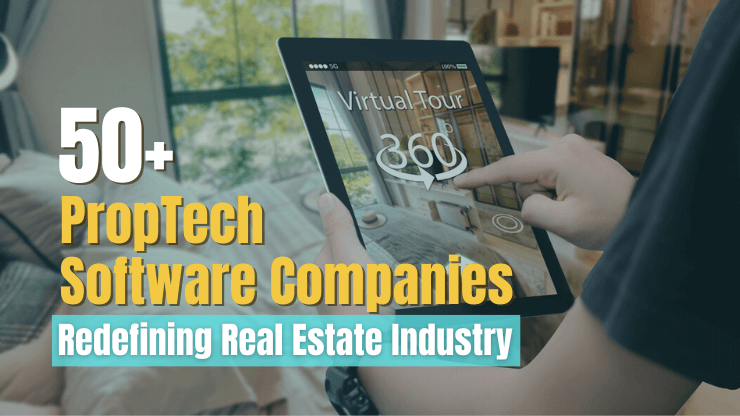
![What is PropTech? 2025 Guide [+15 Fastest-Growing Startups]](/uploads/blog/what-is-proptech/what-is-proptech.png)
![Top 7 Smart Building Software Solutions [2025 Review]](/uploads/blog/smart-building-software/smart-building-software.png)